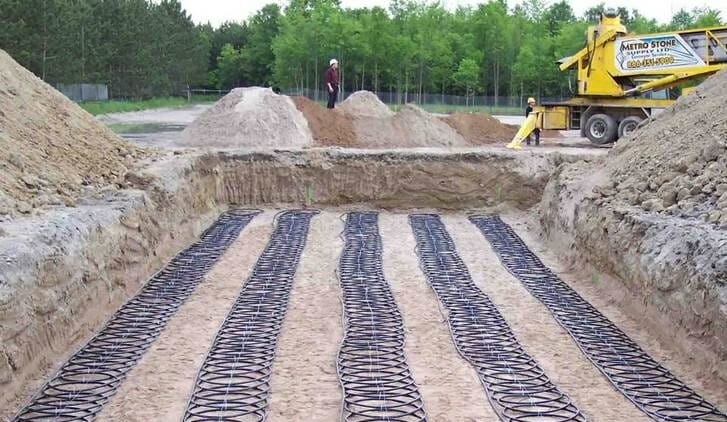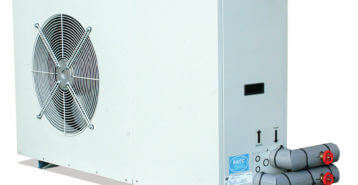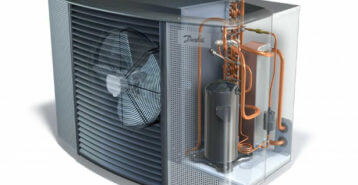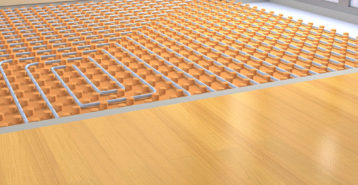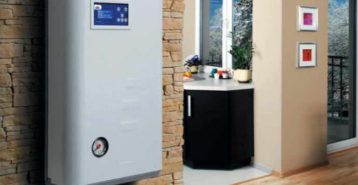What is a Geothermal Heat Pump?
A geothermal heat pump, also known as a ground source heat pump, is a highly efficient heating and cooling system that utilises the earth’s consistent underground temperatures. These systems transfer heat to or from the ground, providing energy-efficient climate control for residential and commercial properties.
Since they use ground as an exchange medium, in stark contrast to other heat pump systems, geothermal heat pumps are highly efficient option for homeowners, which can lead to significant energy savings.
How Much Does a Geothermal Heat Pump Cost?
The cost of a geothermal heat pump system varies based on factors such as home size, system configuration, and installation complexity. Below are common cost ranges:
- Average System Cost: $15,000 to $38,000 for a 2,000 sq. ft. home
- Geothermal Heat Pump Unit: $2,500 to $5,000
- Installation Cost: $10,000 to $33,000, depending on the loop system and excavation requirements
To determine an accurate geothermal heat pump cost for your home, consult a professional contractor who specializes in geothermal installation.
Geothermal Heat Pump Installation
Installing a geothermal heat pump does not come easy as the system can cost several times that of a traditional air-source system. Just the heat pump costs around $2500 to $5000, but installing the whole system can range from $15,000 to $38,000 for a 2,000 sq. ft. home. This cost is based on the size of the system being installed, its basic components, loop type of the pipe that goes in the ground, excavation, ductwork, and the local labor costs.
Here is an average cost breakdown:
- Excavation: $2,000 to $5,000 for horizontal loops; $10,000+ for vertical loops
- Ductwork: $5,000 to $10,000 for new or upgraded systems
- Labor: $4,000 to $10,000 based on site complexity
For larger homes the cost can average to $50,000 for installing a high end ground source heat pumps.
However, you can realize a ROI “Return on Investment” for the additional installation costs in approximately five to ten years. Combine that with a life expectancy of 25 years for a geothermal heat pump’s interior components and 50 plus years for its exterior components and your savings can really add up in a hurry. You will need to find a qualified local geothermal heat pump installer who has worked with this particular HVAC system before.
Types of Geothermal Heat Pumps
Geothermal heat pumps are characterized into four groups. Three of the four named systems are of the close looped variety with the fourth being referred to as an open loop system. Several considerations must be made before choosing the right system for your home. Soil conditions, land space, climate and installation costs all come into play when choosing a geothermal heat pump system. These basic types of systems are suitable for both commercial and residential applications. Each of these ground source heat pumps vary in total HVAC installation costs.
Closed vs. Open Loop Geothermal Heating Systems
The difference between a closed and open-looped system is in the terminology, one utilizes a sealed loop of pipe while the other uses a closed loop of pipe. A closed-loop geothermal system uses a length of plastic tubing or pipe that is buried in the ground or submerged in a nearby lake or pond. An anti-freeze solution circulates through the tubing. A heat exchanger then transfers heat between the solution in the tubing and the refrigerant in the systems heat pump. The most common installation practices of a closed-looped system are as follows:
Horizontal Geothermal Heat Pump Installation
This is a cost-effective method used in both new construction and sites with plenty of available land. Trenches are dug to a depth of at least 4 feet to house the tubing but can vary due to terrain and soil conditions. When space is limited for trench installation, a coiled version of pipe, referred to as a slinky is used that allows a shorter trench to house more tubing.
Vertical Ground Source Heat Pump Installations
There are practical where land space may be limited such as commercial building sites and schools. This method of installation involves boring 4-inch diameter holes into the ground at approximately one hundred to four hundred feet in depth to house the loop of tubing or pipe. Each hole houses two sections of pipe that are joined together at the bottom by a special fitting called a U-bend to complete the loop. A horizontal trench is dug to house the run of tubing between the vertical holes and the heat pump.
Sites with access to a lake or pond offer a cost-effective installation method. The pipes are run underground to the water source where they are looped at least 8 feet under the water’s surface.
Open-looped Geo Heat Pump Systems
These require a body of open water or a groundwater source to provide the solution in the tubing needed for the heat exchange with the heat pump compressor. As you may have figured, the open-looped system is only a viable option when an abundant water source is available.
Geothermal vs Air Source Heat Pump
Today’s energy conscious homeowners have many efficient options from which to choose regarding heating and cooling options rather than just installing a new central ac unit for their homes. Among them, a geothermal heat pump is one of those options that is growing in popularity across the country.
A geothermal heat pump can both heat and cool as well as provide domestic hot water with some models. Other options available with a geothermal heat pump include variable speed fans and two-speed compressors, which increase their efficiency in both performance and energy savings. The initial cost to install is much more expensive than the cost of a new air source heat pump, but the energy saving possibilities are greatly advantageous in the long run. A Geothermal HVAC system requires less maintenance, is quieter and have a longer life expectancy than any other heat pump unit such as a ductless heat pump system.
Some manufacturers combine the best of both worlds of a geothermal and an air-source heat pump. These models are referred to as a dual-source heat pump. Although these units are more efficient than a standard air-source heat pump, they fall short when compared to a stand alone geothermal system. One advantage of a dual-source system is that they are often less expensive to install.
Hybrid Geothermal Heat Pump Systems
The beauty of geothermal heat pump systems is that they can be adapted to combine with the best of traditional technologies to provide efficient heating and cooling systems in varying climates. These hybrid systems offer greater flexibility in extreme climates where weather conditions can vary significantly or in areas where a stand-alone geothermal heat pump is not practical.
Geothermal Heat Pump Lifespan
These systems are the tanks of the heat pump world, with expected equipment life spans of 25 to 50 years. They also are much quieter than their air source heat pump counterparts and require less maintenance. However, these added benefits do not come without an initial installation cost as you can expect to pay significantly more for a geothermal heat pump system versus an air source heat pump.
When hiring professionals to install a geothermal heat pump, be sure to talk about factors like size of your home, location, available land close to your home for installation, soil type, local climate, existing ductwork condition, type of geothermal pump you need and the timeline for execution of the project. All these factors are crucial to determine the cost to install the system.
Compare top-rated HVAC pros in your area.
Read real homeowner reviews, explore qualifications, and view promotions. Modernize makes it easy to browse professionals and find one that will be perfect for your project.


